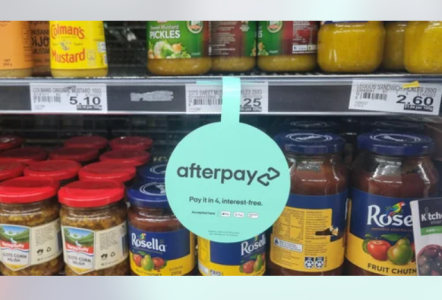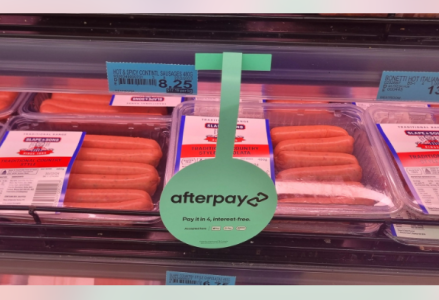‘This needs to stop’: Shoppers outrage at new Buy Now, Pay Later option at supermarket
In the midst of a cost of living crisis affecting millions of Australians, a seemingly innocuous photo of a supermarket aisle has ignited a firestorm of controversy.
The images, which surfaced on social media, showed a 'Buy Now, Pay Later' (BNPL) service being advertised for everyday grocery items, leading to a wave of backlash from concerned consumers.
A customer has taken photos at a Drakes Supermarket in South Australia and posted them on social media, where it quickly became a hot topic.
The supermarket's promotion of the 'Pay it in four, Interest-free' option through Afterpay for basic groceries was met with disbelief and anger from shoppers.
The customer expressed their dismay: 'It's one thing to have Afterpay at all, another to use it for groceries—but I honestly find it ridiculous that the supermarkets are actually promoting this.'
This sentiment was echoed by many others, with comments pouring in condemning the normalisation of debt for essential items.
'Okay, this is genuinely f****d. I implore everyone to call your local MP and tell them how much of a disgrace this is,' one person replied.
‘This needs to stop. People need to be able to live,’ a second person said.
Another commenter pointed out the potential pitfalls of using BNPL services for recurring expenses: 'Everyday items shouldn’t be used on Afterpay. I would say if you have to Afterpay it you can’t afford it.’
‘I can understand emergency items on Afterpay […] but groceries, bills, are the worst things to Afterpay because there’s always more food to buy and another bill to pay,’ they added.
The controversy isn't new. When Drakes Supermarkets introduced Afterpay across its more than 60 outlets in September 2023, it sparked a debate about the financial well-being of vulnerable customers.
Social welfare groups warned of the 'very dangerous debt trap' that could ensnare those already struggling.
Despite the initial backlash, the recent photo has reignited concerns, with many shoppers feeling that the BNPL option for groceries is a step too far in a society grappling with financial pressures.
Drakes Supermarkets Director John-Paul Drake defended the decision, citing customer demand as the driving force behind the move.
'We had so many customers asking us do we accept Afterpay, so we then investigated it, and we thought, “Okay, well, this is okay for us to roll out,”’ he said.
Mr Drake continued: ‘Afterpay was quick to come to the party—obviously they want to get their product out there—and it’s a good fit for us and it’s a good fit for our customers.’
Afterpay, in a statement, clarified that its late fees are capped and that missed payments prevent further use of the service, which they argue helps protect customers from falling into a debt cycle.
The company also emphasised that the majority of their customers use the service responsibly, with 95 per cent of all instalments paid on time and 98 per cent of purchases incurring no late fees.
A spokesperson for Drakes Supermarkets responded to the outcry by emphasising the popularity of Afterpay among Gen Z customers and the importance of offering diverse payment options.
'It’s all about choice—we’re listening to customers who have asked us to offer this option, it’s up to our customers to decide whether it’s the right option for them,’ they stated.
Welfare group SACOSS (South Australian Council of Social Service) has been vocal in calling for stricter provisions around BNPL services and has urged Drakes to reconsider its partnership with Afterpay.
SACOSS CEO Ross Womersley highlighted the risks of enticing people to use credit for essential purchases and the potential for financial hardship that could follow.
‘In this instance, we think that this is just an enticement that is just completely unnecessary, and in fact, we’d be really encouraging Drakes to really walk away from continuing to offer these types of products,’ he explained.
The federal government, on the other hand, has taken a more cautious stance against this service.
On March 12, it announced plans to regulate the BNPL sector amid concerns over unaffordable lending practices and excessive late payment fees.
The proposed regulations could see a more rigorous application process, with providers delving deeper into customers' credit history, income, and expenses.
Some members of our community also weighed in on the use of Afterpay when it was adopted by the Drakes.
Member @BillW41 wrote: ‘I generally like the way Drake does things but, as a pensioner, I don't agree with this move which could get customers into financial trouble. Afterpay and similar services are not a good idea for anyone.’
‘Nothing wrong with BNPL options, but not for weekly shopping at the supermarket. Not the place for such options. Already too many people struggling to make the fortnightly payments,’ member @AlanQ commented.
Meanwhile, member @Tervueren shared their experience using Afterpay: ‘I love AfterPay! I have used it for years, especially when the sales are on and I NEED to buy something and it is available at a fabulous special or low price!’
‘I have NEVER paid interest with Afterpay and to know that Drakes are offering the service is wonderful for those who may need to purchase something and not have the ready cash on hand. As long as you are responsible and aware of the outlay, there are no problems,’ they added.
The debate around BNPL for groceries raises important questions about consumer protection, financial literacy, and the ethical responsibilities of retailers.
 Have you used BNPL services for groceries or other essentials? Do you think it's a helpful tool for managing finances, or does it pose a risk of leading consumers into debt? Share your experiences in the comments below.
Have you used BNPL services for groceries or other essentials? Do you think it's a helpful tool for managing finances, or does it pose a risk of leading consumers into debt? Share your experiences in the comments below.
The images, which surfaced on social media, showed a 'Buy Now, Pay Later' (BNPL) service being advertised for everyday grocery items, leading to a wave of backlash from concerned consumers.
A customer has taken photos at a Drakes Supermarket in South Australia and posted them on social media, where it quickly became a hot topic.
The supermarket's promotion of the 'Pay it in four, Interest-free' option through Afterpay for basic groceries was met with disbelief and anger from shoppers.
The customer expressed their dismay: 'It's one thing to have Afterpay at all, another to use it for groceries—but I honestly find it ridiculous that the supermarkets are actually promoting this.'
This sentiment was echoed by many others, with comments pouring in condemning the normalisation of debt for essential items.
'Okay, this is genuinely f****d. I implore everyone to call your local MP and tell them how much of a disgrace this is,' one person replied.
‘This needs to stop. People need to be able to live,’ a second person said.
Another commenter pointed out the potential pitfalls of using BNPL services for recurring expenses: 'Everyday items shouldn’t be used on Afterpay. I would say if you have to Afterpay it you can’t afford it.’
‘I can understand emergency items on Afterpay […] but groceries, bills, are the worst things to Afterpay because there’s always more food to buy and another bill to pay,’ they added.
The controversy isn't new. When Drakes Supermarkets introduced Afterpay across its more than 60 outlets in September 2023, it sparked a debate about the financial well-being of vulnerable customers.
Social welfare groups warned of the 'very dangerous debt trap' that could ensnare those already struggling.
Despite the initial backlash, the recent photo has reignited concerns, with many shoppers feeling that the BNPL option for groceries is a step too far in a society grappling with financial pressures.
Drakes Supermarkets Director John-Paul Drake defended the decision, citing customer demand as the driving force behind the move.
'We had so many customers asking us do we accept Afterpay, so we then investigated it, and we thought, “Okay, well, this is okay for us to roll out,”’ he said.
Mr Drake continued: ‘Afterpay was quick to come to the party—obviously they want to get their product out there—and it’s a good fit for us and it’s a good fit for our customers.’
Afterpay, in a statement, clarified that its late fees are capped and that missed payments prevent further use of the service, which they argue helps protect customers from falling into a debt cycle.
The company also emphasised that the majority of their customers use the service responsibly, with 95 per cent of all instalments paid on time and 98 per cent of purchases incurring no late fees.
A spokesperson for Drakes Supermarkets responded to the outcry by emphasising the popularity of Afterpay among Gen Z customers and the importance of offering diverse payment options.
'It’s all about choice—we’re listening to customers who have asked us to offer this option, it’s up to our customers to decide whether it’s the right option for them,’ they stated.
Welfare group SACOSS (South Australian Council of Social Service) has been vocal in calling for stricter provisions around BNPL services and has urged Drakes to reconsider its partnership with Afterpay.
SACOSS CEO Ross Womersley highlighted the risks of enticing people to use credit for essential purchases and the potential for financial hardship that could follow.
‘In this instance, we think that this is just an enticement that is just completely unnecessary, and in fact, we’d be really encouraging Drakes to really walk away from continuing to offer these types of products,’ he explained.
The federal government, on the other hand, has taken a more cautious stance against this service.
On March 12, it announced plans to regulate the BNPL sector amid concerns over unaffordable lending practices and excessive late payment fees.
The proposed regulations could see a more rigorous application process, with providers delving deeper into customers' credit history, income, and expenses.
Some members of our community also weighed in on the use of Afterpay when it was adopted by the Drakes.
Member @BillW41 wrote: ‘I generally like the way Drake does things but, as a pensioner, I don't agree with this move which could get customers into financial trouble. Afterpay and similar services are not a good idea for anyone.’
‘Nothing wrong with BNPL options, but not for weekly shopping at the supermarket. Not the place for such options. Already too many people struggling to make the fortnightly payments,’ member @AlanQ commented.
Meanwhile, member @Tervueren shared their experience using Afterpay: ‘I love AfterPay! I have used it for years, especially when the sales are on and I NEED to buy something and it is available at a fabulous special or low price!’
‘I have NEVER paid interest with Afterpay and to know that Drakes are offering the service is wonderful for those who may need to purchase something and not have the ready cash on hand. As long as you are responsible and aware of the outlay, there are no problems,’ they added.
The debate around BNPL for groceries raises important questions about consumer protection, financial literacy, and the ethical responsibilities of retailers.
Key Takeaways
- Drakes Supermarkets introduced the 'Buy now, Pay later' service Afterpay across its outlets despite controversy.
- Shoppers and social welfare groups have expressed concerns that such services could lead consumers into debt, especially for essential items like groceries.
- The federal government is planning to regulate the BNPL sector to prevent lenders from engaging in unaffordable lending practices.
- Afterpay argued that it is a safe and transparent alternative to traditional credit options, and Drakes Supermarkets stated it is responding to customer demand by offering Afterpay.









